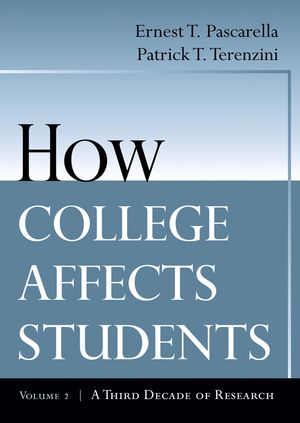How College Affects Students: A Third Decade of Research, Volume 2ISBN: 978-0-7879-1044-0
Paperback
848 pages
February 2005, Jossey-Bass
 This is a Print-on-Demand title. It will be printed specifically to fill your order. Please allow an additional 10-15 days delivery time. The book is not returnable.
|
||||||
"Pascarella and Terenzini have produced anotherencyclopedic masterpiece--thorough, penetrating, insightful,and rich with implications. It is the essential resource foranyone with a serious interest in college studentdevelopment."--George D. Kuh, chancellor's professor anddirector, Center for Postsecondary Research, Indiana University
"In extending their landmark synthesis, Pascarella andTerenzini have reassuringly confirmed their original conclusionsabout college impact. But they also reveal how much broader andricher this literature has become through the addition of topicsthat range from diversity, through community colleges, to newtheories of human development. Their work remainsdefinitive."--Peter Ewell, senior associate, NationalCenter for Higher Education Management Systems (NCHEMS)
"Essential reading for both scholars and campusleaders."--John C. Smart, professor of higher education,University of Memphis and editor, Research in HigherEducation “How College Affects Students is the essential reference for anyone trying to answer the question ‘What works?’ In this new volume, the authors synthesize the most recent body of research that refines this question for the diverse range of students and institutions.”—Jacqueline E. King, director, Center for Policy Analysis, American Council on Education
“Pascarella and Terenzini have produced another encyclopedic masterpiece—thorough, penetrating, insightful, and rich with implications. It is the essential resource for anyone with a serious interest in college student development.”—George D. Kuh, chancellor's professor and director, Center for Postsecondary Research, Indiana University
“In extending their landmark synthesis, Pascarella and Terenzini have reassuringly confirmed their original conclusions about college impact. But they also reveal how much broader and richer this literature has become through the addition of topics that range from diversity, through community colleges, to new theories of human development. Their work remains definitive.”—Peter Ewell, senior associate, National Center for Higher Education Management Systems (NCHEMS)
“Essential reading for both scholars and campus leaders.”—John C. Smart, professor of higher education, University of Memphis and editor, Research in Higher Education



